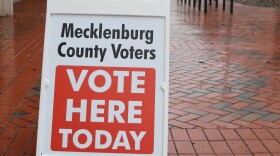Durham Public Schools' administrators are moving forward to apply for federal eligibility to provide universal free meals to all its students.
“Durham County is part of a larger national movement in this direction,” said Marianne Weant, with the North Carolina Alliance for Health, a member of the School Meals for All North Carolina coalition.
Several students and other advocates spoke in favor of universal free meals at the Durham Public Schools Board of Education meeting Thursday night.
Daniela Flores spoke about how she struggled to pay for lunch years ago when she was a student at Riverside High School.
“My parents didn't know about the lunch application and couldn't give me money for my school lunch. Thank goodness I had good friends who would share their lunch with me,” Flores said.
“Not only will we have the opportunity to improve the quality of food, but the research says that students in schools that participate in [universal free meals], have higher academic and overall achievement,” parent advocate Norma Portillo told the board.
District administrators are planning to apply for federal funding for the program this spring. If accepted, Durham Public Schools would provide free breakfast and lunch for all students, regardless of their family income or school, beginning next school year.
Federal guidelines now allow more districts to apply for universal free meals, but it comes with trade-offs
The federal school meals program allows schools or districts in which a large proportion of students would likely be eligible for free or reduced price meals to receive federal funds to provide free breakfast and lunch to all students.
This “community eligibility provision” means students do not have to individually apply for subsidized meals, if enough of the overall student population meets certain markers of poverty, such as participation in SNAP (Supplemental Nutrition Assistance Program) or Medicaid.
Federal requirements are changing this year, making more school districts eligible for universal free meals. Durham Public Schools is taking advantage of an extended application period due to that change to apply for next school year.
The federal threshold for “community eligibility” has been lowered, so that the minimum proportion of eligible students to qualify has reduced from 40% to 25%. Durham Public Schools meets that threshold with 46% of students being eligible.
“Most districts in North Carolina are over 25%, so that means most districts are now eligible,” said Weant, with School Meals for All North Carolina.
But, she added that it can still be a complicated decision for school districts that are considering applying. That’s because the federal program doesn’t provide 100% reimbursement for all meals served under “community eligibility.” The higher percentage of students in poverty that a school district serves, the more federal funds that district will receive to provide the free meals.
“Now, what that leaves districts in a position to figure out is, can we make that work?” Weant said. “It may not make financial sense unless their county commissioners or their school board wants to appropriate funds to offset the cost.”
More than fifty school districts across North Carolina currently offer universal free meals under “community eligibility.” Most are districts in which well over 40% of students meet the eligibility criteria.
Weant said other school districts like Wake County Schools and Johnston County Schools are technically eligible to apply now, but would likely need additional local funds to finance the meals.
But if a school district is able to make the funding work, there are many benefits. More students will be fed each day. Data from districts that have implemented free meals show that more students receive cafeteria meals because the stigma around school lunch goes away when it’s not associated with income.
District-wide eligibility also means that students no longer have to fill out applications to qualify for free or reduced price lunch. That saves districts time and administrative costs, because they no longer have to process those applications — nor do they have to hound families that have unpaid meal debt, because no students will owe money for their meals.
“One of our school district partners told us that last year, I believe they spent over $100,000, just trying to capture meal debt from students,” Weant said.
Since participating districts will no longer have an exact count of how many students are eligible for free or reduced price lunch, they will also have to change how they apply for other federal Title I funding related to poverty. That could alter funds for resources, such as additional staff positions in schools that serve more low-income students.







